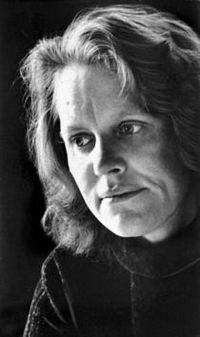Vizma Belševica facts for kids
Quick facts for kids
Vizma Belševica
|
|
|---|---|

Vizma Belševica
|
|
| Born | May 30, 1931 Rīga, Latvia |
| Died | August 6, 2005 (aged 74) Rīga, Latvia |
| Occupation | Writer, poet, translator |
| Nationality | Latvian |
Vizma Belševica (born May 30, 1931, died August 6, 2005) was a famous Latvian poet, writer, and translator. She was even nominated for the important Nobel Prize in Literature! This means her writing was recognized around the world.
Contents
Early Life and Family
Vizma Belševica was born on May 30, 1931, in Riga, the capital city of Latvia. Her father, Žanis Belševics, was a worker, and her mother, Vera Belševica, was a housewife. Her family was not wealthy.
Vizma spent most of her childhood in Riga. This city often appears in her stories and poems. She also spent time on a small farm in Courland with relatives. This time in the countryside was also very important for her writing.
Vizma's sons also became writers. Her son Klāvs Elsbergs was a well-known Latvian poet in the 1980s. Her second son, Jānis, is also a writer.
Awards and Recognition
When Vizma was a child, she loved to read classical books. She dreamed of one day winning the Nobel Prize. Her hard work and talent were recognized throughout her life.
On December 6, 1990, she became an honorary member of the Latvian Academy of Sciences. This is a very high honor for a scholar or artist in Latvia. She also received the Spidola Award twice. This is the top award in Latvian literature.
Vizma Belševica also received the highest award from the Latvian government. This award is called the Three Star Order. These awards show how important her work was to Latvia.
Important Works
Vizma Belševica started publishing her poems in 1947. Her first book of poetry came out in 1955. Some of her most famous poetry collections include Jūra deg (The Sea is Burning, 1966) and Gadu gredzeni (Annual Rings, 1969).
She also wrote collections of short stories. These include Ķikuraga stāsti (Stories from Kikurags, 1965).
One of her most important works is a series of three books. These books tell the story of a girl named Bille. They are like a diary of Bille's life in Latvia from the late 1930s through the 1940s. They show what life was like during the Soviet and Nazi occupations.
The books in this series are:
- Bille (1992, 1995)
- Bille un karš (Bille and War, 1996)
- Billes skaistā jaunība (The Wonderful Youth of Bille, 1999)
This "Bille" series is now considered one of the most important works in all of Latvian literature.
Global Reach and Challenges
Vizma Belševica's poems and stories have been translated into about 40 different languages. This shows how popular and important her writing is around the world. Her works have been published in countries like Sweden, Norway, Denmark, and Germany.
During the 1970s, Latvia was part of the Soviet Union. Vizma Belševica's writing sometimes criticized the way people were treated. Because of this, she was not allowed to publish her work from 1971 to 1974. Her name could not even be mentioned in the news.
See also
 In Spanish: Vizma Belševica para niños
In Spanish: Vizma Belševica para niños

